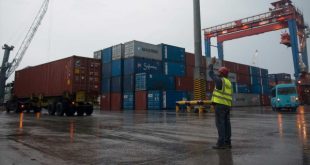
By Kenneth Jukpor
Following the recent directive of Nigeria Customs Service (NCS) that one of the requirements for clearance of used vehicles at ports will be vehicle log books, the Vice President of the Association of Nigeria Licensed Customs Agents (ANLCA), Dr. Kayode Farinto has described the move as unrealistic.

Dr. Farinto who was speaking with journalists in his office yesterday lamented that vehicle log book is obsolete as most used vehicles no longer come with the document.
According to Farinto, the relevant data NCS intends to get from the log book could also be obtained from vehicle identification number (VIN) when entered into a VIN decoder.

VIN is a unique code, including a serial number, used by the automotive industry to identify individual motor vehicles and it could reveal the year of manufacturing and model of vehicles which are vital data for Customs.

Farinto also called for the review of the Customs and Excise and Management Act (CEMA) which supports the utilization of a vehicle log book as a requirement for clearance of used vehicles.
Recall that NCS in a circular dated April 23, 2021 and signed by the Deputy Comptroller General (T&T) TM Isa and sighted by our correspondent, stated that Vehicle Log Book will be a mandatory requirement for the clearance of used vehicles after a grace period of 90 days.
“Vehicle Log Book is now mandatory requirement for the importation of any used vehide into the country. This is in consonance with the provisions of Customs & Excise Notice No.30 of 6th December, 1971.”
“Consequently, a grace period of 90 days, effective from the date of this circular, is allowed to enable all importers who must have entered into trade transactions before this circular, process and clear their vehicles,” the Customs document stated.
Meanwhile, Dr. Farinto posited that the relevance of having the logbook in the past was to ascertain the model of the vehicle, year of manufacture and repair history but noted that over the years technological advancement has seen VIN replace the need for log books.
Farinto opined that the directive will further encourage corruption, as freight agents may be forced to begin to forge log books, while Customs officers could also use the absence of log books to extort importers and freight agents.
His words: “This directive of Customs that it is mandatory for any vehicle that must be cleared at the nation’s ports to have logbook is wrong. It looks like the management of Customs is taking us backward, and we are not in medieval period. I know that the relevant section of the law quoted by the DCG was enacted in 1971 and it says if you are going to clear any vehicle in seaport, you must have what is called a logbook.”
“The relevance of having the logbook then was to ascertain the model of the vehicle and year of manufacture. However, over the years in Customs operations viz aviz; WCO procedure, a lot of things have been put in place to ascertain the manufacturer, the year of manufacture and the body of the vehicle and that thing is called VIN.”
He lamented that over 70 percent of the logbook are not even written in English because they are usually from vehicles coming from Europe; meanwhile, most of the imports of used vehicles today arrive from United States of America (USA).
The ANLCA Vice President also expressed regret that stakeholders were not consulted before Customs came up with the directive, noting that the idea would have been squashed if proper consultation was done.
 MMS PLUS NG – Maritime, Aviation, Business, Oil and Gas News Online Newspaper with coverage in Maritime, Oil and Gas, Aviation, Power and Energy as well as Financial News
MMS PLUS NG – Maritime, Aviation, Business, Oil and Gas News Online Newspaper with coverage in Maritime, Oil and Gas, Aviation, Power and Energy as well as Financial News









